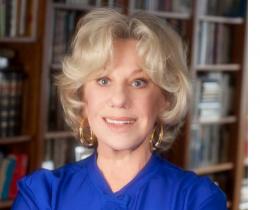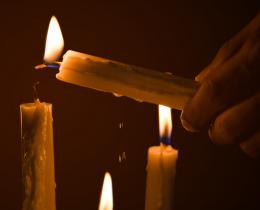Dearest Bette,
You are so young, so before all beginning, and I want to beg you, as much as I can, to be patient toward all that is unsolved in your heart and try to love the questions themselves like locked rooms and like books that are written in a very foreign tongue.
—Rainer Maria Rilke
When Fear of Flying was published, nearly 40 years ago, the world was a different place for girls and women.
There were few women studying law and medicine in America, no female secretaries of state like Hillary Clinton or Madeleine Albright, no women on the Supreme Court, few women in Congress—even fewer than now—and few women poets writing in English who were not considered laughable.
Even girls thought Edith Sitwell risible. And nobody had heard of Marianne Moore, who famously called poetry a make-believe garden with real toads. Sappho was known as a freak who liked girls better than boys, rather than as the 2,600-year-old inventor of love poetry. And even though Edith Wharton and Virginia Woolf had already come and gone, even though Doris Lessing was writing her revolutionary novels, most published women novelists wrote mysteries and mad-housewife novels as they now write mysteries and chick lit. Their book covers were often, as now, pink.
Of course, we were not totally in the pink ages. I wanted to be both a doctor and a poet—like Anton Chekhov and William Carlos Williams—and I might have done it had not dissecting the fetal pig in Zoology 1-2 during my first year at Barnard done me in. Zoology labs were required for premeds, but I swooned and nearly fainted from the formaldehyde smell and ended up dissecting the wrong aorta.
Both my parents had supported my ambitions completely. My artist mother, your great-grandmother, had read me poetry throughout my childhood. Emily Dickinson, Edna St. Vincent Millay, and Dorothy Parker were as dear to me as Winnie-the-Pooh and Madeline. And my father, your great-grandfather, a pop and jazz musician turned importer, pledged happily to pay for my medical education. Omar Khayyam was a family obsession, as were Rodgers and Hart, Cole Porter, and Irving Berlin.
Doctors and poets have a similar mission—tikkun olam, or healing the world—so my ambitions were actually quite similar.
But it was not to be—all because of that inconvenient fetal pig. So I stuck with writing, becoming a poet and then a novelist, and utterly surprised myself in 1974 when I woke up, like George Gordon, Lord Byron, “to find myself famous.” And famous for being naughty—as Byron was before me. I was supposed to be one hot chick who hopped between the sheets as soon as zippers fell. The reason for this misconception was a phrase that came into my head while writing: “the zipless fuck.” My editor had tried to expunge it, but I kept the phrase because I loved it. What was ziplessness anyway? A sort of platonic ideal—fantasy instantly realized because of the sheer force of attraction. I wrote Fear of Flying, or “that book” (as nearly everyone called it), all through my twenties—writing and rewriting, tearing it up and starting over in first person or third person—until I was sure the voice was right for a mock memoir by a smart, wisecracking, half-analyzed New York girl in the 1970s. Of course, I had no idea whether “that book” was publishable or if it would even be around for more than five minutes. I only knew I had to write it, or die. (Always an excellent way to start a novel.)
In my other life then, I was a lapsed graduate student in English literature of the eighteenth century at Columbia University as well as a lapsed instructor in literature from Chaucer to Pope at the City College of New York. Poetry was my first love, but novels were actually read in America as poems were not and, like all writers, I desperately wanted to be read.
I was certainly inspired to begin the novel by the burgeoning interest in what women said and did and needed. The so-called “second wave” of women’s struggle for equal rights had begun in the late 1960s with the civil rights movement. (The first wave, from the1880s to 1920, had won American women the vote in 1920). The second wave won us the right to birth control, safer childbirth, and the pregnant woman’s privilege of consulting an obstetrician/gynecologist rather than a politician or a priest.
Some waggish Catholic women came up with the slogan “Get Your Rosaries Off My Ovaries” to describe the previous period, and the majority of us—Catholic or not—felt relieved to be able to consult doctors rather than the Vatican in matters of our health.
Actually, the movement for English-speaking women to be able to attend to our unique needs—bodily and otherwise—had begun during the Enlightenment with a manifesto called A Vindication of the Rights of Women (1792), which was written by a brilliant Englishwoman named Mary Wollstonecraft, who died in childbirth at thirty-eight. The daughter who emerged from that wounded womb was Mary Wollstonecraft Godwin, later Mary Wollstonecraft Shelley. As a teenager, she ran off and married poet and revolutionary Percy Bysshe Shelley, and later published her most popular book, Frankenstein; or, The Modern Prometheus (1818). Some scholars and critics have speculated that losing many babies (as women did then) led her to write a fable of reanimating a corpse. I leave that to your fierce intelligence.
Mary Wollstonecraft had not concerned herself with childbirth—fatal as it often was to women and children in those days. And still is in much of the world. She had focused purely on the rights of women to education, political participation, and marital equality. The women’s health movement came two centuries later. Still, it was built upon Enlightenment ideals of social and political equality for women.
Like so many eighteenth-century intellectuals, Mary Wollstonecraft had spent her twenties in France, falling in love with revolutionary ideas and a certain Gilbert Imlay, who became the father of her first child, Fanny. Mary W. was a single parent when she met and fell in love with William Godwin, author, philosopher, and minister. The lovers, of course, met at a London dinner party for Thomas Paine, the American author and revolutionary.
William Godwin (1756–1836) was the founder of something called philosophical anarchism: the idea that government is a corrupting force in society, fostering dependence and ignorance.
If that sounds familiar, it is. Even today the idea has currency in the USA—a country very much grounded in Enlightenment ideas. Those who claim we pledge allegiance “under God” are blissfully ignorant of our revolutionary Deist history. Puritan settlers had fled religious wars and vowed never to fight them, and the men who wrote our Constitution fervently wanted to get away from bloodshed in the name of God. They dreamed of a country wholly without kings and priests, where men would not kill each other over differences of religious opinion. America gave the world religious freedom—however much our holy rollers may wish to forget it.
Like so many adolescent girls, Mary Wollstonecraft Godwin became enthralled to a poet with a handsome face. The Romantic movement was just beginning, and Mary and Percy Bysshe Shelley were to become two of its greatest avatars.
However, Shelley died extremely young—drowned off the coast of Lerici in Italy, leaving Mary with orphans and a writing desk. She was the keeper of his flame—while also having managed to write the book that started the entire Frankenstein tradition. Mary Shelley has kept publishers and movie studios in the black for centuries.
No book is born out of solid rock. It has precursors and parents. Fear of Flying could never have emerged without a complex screed about the rights of women (an answer to Thomas Paine’s Rights of Man). All women writers in English stand on the backs of two Marys, whether we know it or not.
But my novel was hardly a treatise on the rights of women, though some readers have seen it as that. My rule was always: Make the reader turn the page. So I wrote a funny, outrageous novel about rebellion and sex.
No book is any good if it doesn’t make the reader think it is real. Readers thought the book so real that they showed up at my doorstep after leaving their husbands. I became the writer as sexual guru—the advisor to the lovelorn and frustrated—both female and, later, male.
Fear of Flying was despised by prudes, beloved by rebels and rabble-rousers. It was claimed by Henry Miller to be the female answer to Tropic of Cancer. It was said by John Updike to be another Catcher in the Rye. Through the years, it was blamed and praised in equal measure. It was said to be the book that gave women a wandering eye and made adventurous rogues “get lucky.”
Even today readers stop me in the street to thank me. When I give readings, I see copies of my own book so marked with asterisks and stars that they are almost unreadable. This is perhaps the best compliment an author can get.
Now Fear of Flying will appear for the first time in zeroes and ones. It is about to take me on another journey and teach me new things. I certainly hope it does the same for you when you are old enough to read it.
Because you are blood of my blood and bone of my bone, I hope it inspires you to seize your own life. Don’t be afraid of mistakes. Everyone makes them. Don’t be afraid of risk. It teaches us more than safety. Be true to your dream, whatever it may be, even if it wasn’t mine. Be proud of all the great women who came before you. And remember you are the daughter of a daughter of a woman who made her own luck—even when she had no idea what on earth or heaven she was doing.
ERICA JONG
Shanghai, China
October, 2011
Alas! the love of women! it is known
To be a lovely and a fearful thing;
For all of theirs upon that die is thrown,
And if ’tis lost, life hath no more to bring
To them but mockeries of the past alone,
And their revenge is as the tiger’s spring,
Deadly, and quick, and crushing; yet, as real
Torture is theirs, what they inflict they feel.
They are right; for man, to man so oft unjust,
Is always so to women; one sole bond
Awaits them—treachery is all their trust;
Taught to conceal, their bursting hearts
despond
Over their idol, till some wealthier lust
Buys them in marriage—and what rests
beyond?
A thankless husband—next a faithless lover—
Then dressing, nursing, praying—and all’s over.
Some take a lover, some take drams or prayers,
Some mind their household, others
dissipation,
Some run away, and but exchange their cares,
Losing the advantage of a virtuous station;
Few changes e’er can better their affairs,
Theirs being an unnatural situation,
From the dull palace to the dirty hovel:
Some play the devil, and then write a novel.
—Lord Byron (from Don Juan)



